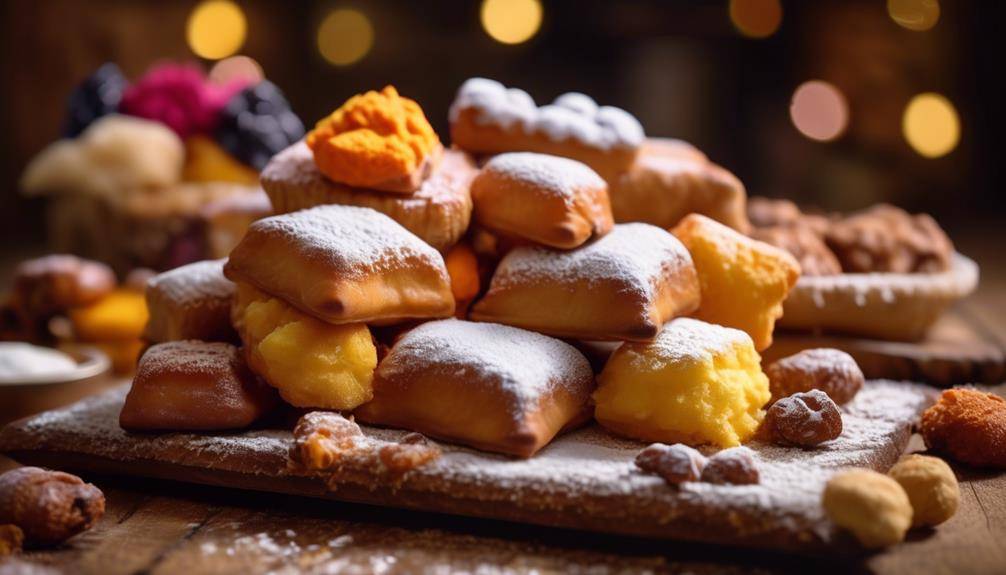Popular Italian Coffee Culture And Traditions

Italian Coffee Culture And Traditions; Get ready to immerse yourself in the enticing world of Italian Coffee Culture and Traditions! From the bustling cafes of Milan to the charming streets of Rome, Italy is renowned for its deep-rooted love affair with coffee. Italians take their coffee seriously, and their passion for this aromatic beverage is evident in every sip.
Whether you’re a fan of a strong espresso or prefer a frothy cappuccino, you’ll find that coffee in Italy is an art form, carefully crafted by skilled baristas. But it’s not just about the drink itself – coffee plays a crucial role in Italian social gatherings and is deeply intertwined with the country’s culinary traditions. So, grab a cup and get ready to delve into the rich world of Italian Coffee Culture and Traditions!
A Brief History of Italian Coffee
Italian coffee has a rich and fascinating history that you’ll enjoy learning about. It all began in the 16th century when coffee was introduced to Italy through the port of Venice. The Italians quickly became enamored with this new beverage, and it didn’t take long for coffee houses to spring up all over the country. These establishments became social hubs where people would gather to drink coffee, engage in intellectual discussions, and even conduct business.
The true origins of Italian coffee can be traced back to the city of Naples. It was here that the first espresso machine, known as the “macchinetta,” was invented in the 19th century. This revolutionary invention allowed for the rapid extraction of coffee, resulting in a strong and flavorful beverage that could be enjoyed in a matter of seconds. The macchinetta laid the foundation for the espresso culture that is so deeply ingrained in Italian society today.
As the popularity of coffee grew, so did the demand for quality beans. Italy began importing coffee beans from countries such as Brazil, Ethiopia, and Colombia. These beans were then roasted to perfection, creating a rich and aromatic blend that is the hallmark of Italian coffee.
Over the years, Italian coffee has evolved into a true art form. Baristas are highly skilled individuals who take pride in their craft. They carefully select the beans, grind them to the perfect consistency, and expertly brew the coffee, ensuring that each cup is a masterpiece.
The history and origins of Italian coffee are intertwined with the culture and traditions of Italy. It is a beverage that is deeply cherished and respected. So the next time you sip on a delicious cup of Italian coffee, take a moment to appreciate the centuries of history and craftsmanship that went into creating that perfect brew.
The Art of Ordering Coffee in Italy
When ordering coffee in Italy, mastering the art of communication is essential. Italians take their coffee seriously, and understanding the ordering etiquette is key to experiencing the true essence of Italian coffee culture. Whether you find yourself in a bustling café in Milan or a quaint coffee bar in Naples, the rituals and customs associated with ordering coffee vary from region to region.
In Italy, there are two main types of coffee orders: al banco (at the counter) or al tavolo (at the table). If you want to fully immerse yourself in the local experience, ordering your coffee al banco is the way to go. Simply approach the counter, catch the barista’s eye, and confidently state your preferred coffee drink. The barista will prepare your coffee on the spot, and you can savor it standing up, just like the locals do.
However, if you prefer a more relaxed experience, you can opt for ordering your coffee al tavolo. Find a table, sit down, and a waiter will come to take your order. It’s worth noting that when ordering coffee at a table, the price is usually higher than when ordered at the counter due to the added service.
It’s important to remember that each region in Italy has its own unique coffee traditions. For example, in Naples, the birthplace of espresso, locals often enjoy their coffee with a sprinkle of cinnamon or a twist of lemon peel. In Milan, on the other hand, it is customary to order a cappuccino only in the morning, as locals believe that milk-based drinks are too heavy for the rest of the day.
Mastering the art of ordering coffee in Italy is not just about the words you say, but also about understanding the regional variations and customs. So next time you find yourself in an Italian café, immerse yourself in the culture and indulge in the rich flavors of Italian coffee.
The Role of the Barista in Italian Coffee Culture
As you step into an Italian coffee bar, the role of the barista becomes immediately apparent. With their expert knowledge of coffee and the art of espresso making, they are the maestros behind the counter, orchestrating the symphony of flavors that make up your perfect cup. But it’s not just about the coffee. The barista’s customer interaction skills are just as important, creating a welcoming and personalized experience that enhances the enjoyment of your daily caffeinated ritual.
Barista as Coffee Expert
To truly immerse yourself in the world of Italian coffee culture, it is essential to recognize the barista as a coffee expert with an integral role in the experience. In Italy, becoming a barista is not just a job, it is a craft that requires dedication and skill. Baristas undergo extensive training to perfect their technique and knowledge of coffee.
They learn about various brewing methods, the art of espresso extraction, and the science behind creating the perfect cup. But it doesn’t stop there. A true barista in Italian coffee culture is also expected to master latte art techniques, creating beautiful designs with steamed milk. The barista’s expertise goes beyond simply making coffee; they provide an immersive and memorable experience for coffee lovers, elevating the act of drinking coffee to an art form.
Art of Espresso Making
To truly appreciate the art of espresso making, it is essential for you to understand the integral role that the barista plays in Italian coffee culture. The barista is not just a coffee maker, but a skilled artisan who takes pride in crafting the perfect shot of espresso. Here are four reasons why the barista is so important in Italian coffee culture:
- Expert knowledge: Baristas have a deep understanding of coffee beans, roast profiles, and extraction techniques, allowing them to create a wide range of espresso variations with complex flavors.
- Precision and consistency: A barista’s attention to detail ensures that every shot of espresso is brewed to perfection, maintaining the quality and consistency that Italians demand.
- Latte art techniques: Baristas possess the creativity and skill to transform a simple cup of espresso into a stunning work of art, using techniques like free pouring and etching to create intricate designs on the milk foam.
- Customer experience: Baristas are not just coffee makers, but also ambassadors of Italian coffee culture. They engage with customers, sharing their passion and knowledge, creating a warm and inviting atmosphere in the coffee shop.
In Italian coffee culture, the barista is the heart and soul of the espresso-making process, ensuring that every cup is a true masterpiece.
Customer Interaction Skills
The barista’s customer interaction skills are essential to the role they play in Italian coffee culture, creating a welcoming and engaging experience for coffee enthusiasts. In Italy, customer satisfaction is highly valued, and the barista is expected to go above and beyond to ensure that every customer feels welcomed and appreciated. Cultural differences play a significant role in these interactions, as Italians have a strong sense of hospitality and take pride in their coffee traditions.
Baristas must possess excellent communication skills, as they engage with customers from all walks of life, from locals to tourists. They must be knowledgeable about different coffee varieties and brewing methods, offering suggestions based on individual preferences. The barista’s ability to connect with customers and provide a memorable experience is key to maintaining the rich Italian coffee culture.
The Social Significance of Coffee in Italian Communities
In Italian communities, coffee serves as a vital catalyst for social interaction and connection. It is not just a beverage; it is a way of life. Italians take their coffee rituals and traditions seriously, and they understand the power of this humble drink to bring people together. Here are four ways in which coffee holds immense social significance in Italian communities:
- The Coffee Bar: The local coffee bar is the heart and soul of the community. It is where people gather every morning before work, catching up on the latest news, sharing stories, and exchanging pleasantries. The barista knows everyone’s order by heart and takes pride in serving the perfect cup of coffee, creating a warm and welcoming atmosphere.
- The Coffee Break: Italians believe in savoring every moment, and the coffee break is no exception. It is a sacred time when colleagues step away from their desks to enjoy a cup of espresso. This brief interlude allows for informal conversations, idea sharing, and building relationships, fostering a sense of camaraderie and collaboration.
- The After-Dinner Espresso: At the end of a long, satisfying meal, Italians indulge in a shot of espresso. This tradition symbolizes the completion of the dining experience and provides an opportunity for friends and family to linger at the table, engage in lively discussions, and deepen their connections.
- The Coffee Invitation: In Italian culture, inviting someone for a coffee is an invitation for meaningful conversation and connection. It is a gesture of hospitality and friendship, allowing individuals to bond over a shared love for the beverage and engage in heartfelt discussions that forge lasting bonds.
Coffee is more than just a drink in Italian communities. It is a symbol of togetherness, a means of fostering connections, and a conduit for social interaction. So next time you find yourself in an Italian community, take a moment to immerse yourself in the rich coffee culture and experience the warmth and camaraderie that it brings.
Traditional Italian Coffee Drinks You Must Try
Explore the enticing array of traditional Italian coffee drinks that are a must-try for coffee lovers like you. Italy is renowned for its rich coffee culture and has given birth to a variety of traditional coffee recipes that have become world-famous. From the classic espresso to the indulgent cappuccino, these beverages offer a delightful experience that encapsulates the essence of Italian coffee traditions.
One of the most beloved Italian coffee drinks is the espresso. Served in a small cup, this concentrated shot of coffee is made by forcing hot water through finely ground coffee beans. Its intense flavor and velvety texture make it the perfect pick-me-up for those in need of a quick caffeine boost.
For a more indulgent treat, try the cappuccino. This iconic drink combines equal parts espresso, steamed milk, and frothed milk, creating a creamy and satisfying blend. Traditionally enjoyed in the morning, cappuccino is a perfect way to start your day on a high note.
If you’re in the mood for something sweet, the affogato is a delightful choice. This dessert-like coffee drink consists of a scoop of vanilla gelato or ice cream drowned in a shot of hot espresso. The combination of creamy and warm flavors is simply heavenly.
When it comes to famous Italian coffee brands, Lavazza and illy are among the most renowned. These companies have a long-standing history of producing high-quality coffee beans and blends, ensuring that you get the authentic Italian coffee experience.
Coffee and Italian Cuisine: A Perfect Pairing
Discover the perfect pairing of coffee and Italian cuisine. When it comes to Italian food, pasta is undoubtedly one of the most beloved dishes. And what better way to complement the rich flavors of pasta than with a cup of coffee? In Italian culture, coffee holds great importance and is an integral part of daily life. Its strong and bold flavors enhance the experience of indulging in the diverse flavors of Italian cuisine. Here are four reasons why coffee and Italian cuisine make a perfect pairing:
- Contrast in flavors: The robust bitterness of coffee beautifully contrasts with the rich and creamy sauces that often accompany pasta dishes. It adds a layer of depth to the palate, elevating the overall taste experience.
- Cleanses the palate: Coffee acts as a palate cleanser, refreshing your taste buds between each bite of pasta. It helps to cleanse the palate from the lingering flavors and prepares your senses for the next flavorful bite.
- Digestive aid: In Italian tradition, a cup of coffee is often enjoyed after a meal to aid digestion. Its caffeine content stimulates the digestive system, helping to break down the heavy and rich ingredients commonly found in Italian cuisine.
- Cultural connection: Coffee has been an integral part of Italian culture for centuries. Enjoying a cup of coffee with your pasta not only enhances the flavors but also allows you to embrace the rich culinary heritage of Italy.
Exploring Italian Coffee Rituals and Customs
Immerse yourself in the rich traditions and rituals of Italian coffee culture. Italian coffee etiquette is deeply ingrained in the daily lives of Italians, and it varies slightly from region to region. Traveling through Italy, you will notice the subtle differences in coffee customs that reflect the uniqueness of each area’s culture.
In the north, particularly in cities like Milan, coffee is often enjoyed standing at the counter of a café. This quick espresso break is known as “caffè sospeso” or “suspended coffee,” where patrons can pay for an extra coffee for someone in need. It is a beautiful gesture that embodies the spirit of community and generosity.
As you venture further south to Naples, you will find the birthplace of the iconic Neapolitan espresso. Here, coffee is a daily ritual, with locals sipping their espresso in one swift gulp. The art of “caffeinating” oneself is deeply rooted in the Neapolitan culture, where the aroma and taste of the coffee take center stage.
In Sicily, coffee gets a sweet twist with the addition of almond-flavored syrup in their famous “caffè al mandorla.” This indulgent treat is typically enjoyed alongside a traditional Sicilian pastry, such as the cannoli or the cassata.
No matter where you are in Italy, one thing remains constant – coffee is savored slowly, enjoyed with friends and family, and never rushed. It is a moment of respite from the hustle and bustle of daily life, a time to pause and appreciate the simple pleasure of a perfectly brewed cup of coffee.
Conclusion: Italian Coffee Culture And Traditions
Italian coffee culture is a rich tapestry of history, artistry, and community. From the moment you step foot in an Italian café, you are enveloped in the aroma of freshly brewed espresso and the vibrant energy of the barista. The social significance of coffee in Italian communities cannot be understated, as it serves as a catalyst for connection and conversation. Traditional Italian coffee drinks, paired with delicious cuisine, create a sensory experience like no other. Immerse yourself in the rituals and customs of Italian coffee, and savor every sip of this beloved cultural tradition.








